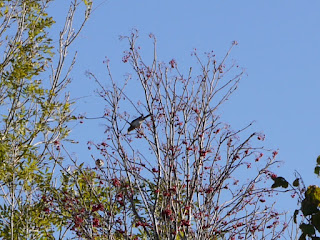I cannot read the ocean. I am a lands-woman,
and all my life have been drawn to the sanctuary of trees. The house of my
childhood was called Hazel Grove, the grove being a small wildness of hazel
bushes beyond our back garden. It was there that my siblings and I spent our
days, for that small coppice reared us. We were not feral, no not feral, more
like hunter-gathers that scavenged briars and branches throughout the growing
season. We threaded wild strawberries onto long filaments of grass; purple
stained our mouths with blackberries that we had cooked over our daily
campfires. We gnawed the flesh off ripe haws as if they were miniature apples, only
ever returning to the edge of our boundary wall when a growing spurt made us
extra hungry and we shouted into our overworked mother that we wanted ‘a piece’.
She understood that single word and did our bidding, hurried out to hand us a piece
of bread and jam that we demolished before we hightailed it back to the
under-wing of branch, of leaf.
But
it was when it came to the hazel tree that we were true foragers. We knew
nothing of its reverence in Celtic lore or Greek mythology, its connection to
divination and dowsing. We did not know that the messenger of the Gods, Hermes,
carried its stick or that poor demented Aengus went off wandering in its wood
with a fire raging in his head. But we knew its power all right. When we had done something particularly
punishable, our mother lined us up on the cold kitchen floor, cut and peeled a
hazel wand and threatened us by putting it under each of our noses. “Smell
that, smell that!” she commanded. It was all it took, its potency so great that
just to sniff its mystical scent had us quivering in our standing and forced confessions
from us as effective as any interrogator.
Nor did we know that its fruit was
equated with wisdom and poetic inspiration: That it was the hazelnut falling
into the mouth of the salmon of knowledge that in turn made Fionn Mac Cumhaill
the clever clogs that he was. All we knew was that when autumn came we were
connoisseurs in the art of gathering. We tracked the timing of its development
from the white embryo of early summer to a blush of pink that appeared on its
August shell. We studied the branches, debated the way the cobs hid themselves under
leaves, and rated their grouping from the paucity of a single one to the magic
of a five- star cluster. Like the best hunters, we learned by experience that
unripe nuts were not for consumption. They gave us black mouths and angry
rashes that had us scratching all night and our mother worn out going from bed
to bed to soothe arms and legs with calamine lotion. So we practised denial,
not touching such temptation until days began to lose light and shells bronzed,
hardened, turned nut-brown. We had the knack when it came to checking them for
ripeness. One push from the thumb and they had to surrender from their sheath,
gracefully. It was then time to grab our paper bags, head off into the day,
climb stone walls; cover tracts of mossy terrain to search out the bread of
angels.
And then came the best bit. We
filled bowls with the brown kernels, topped them with sugar and milk and feasted
on our largesse. We never knew until we were much older and the word became
part of breakfast vocabulary that we had created our own Muesli, Galway Muesli.
